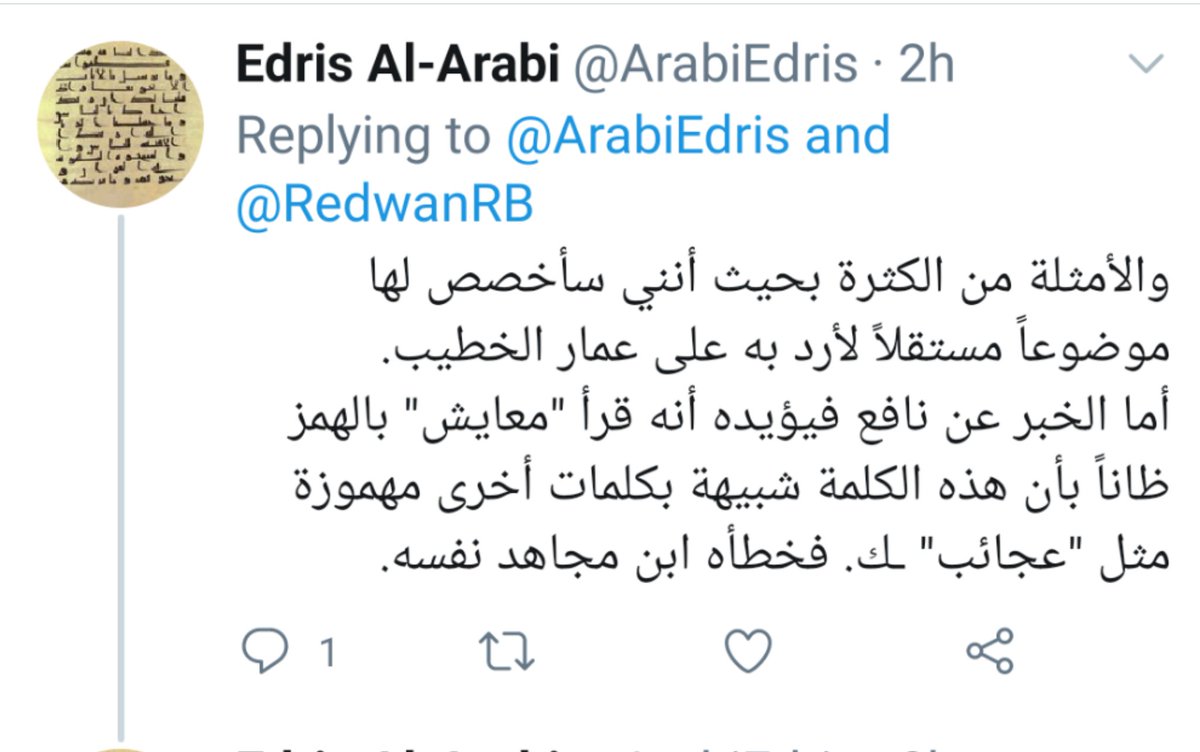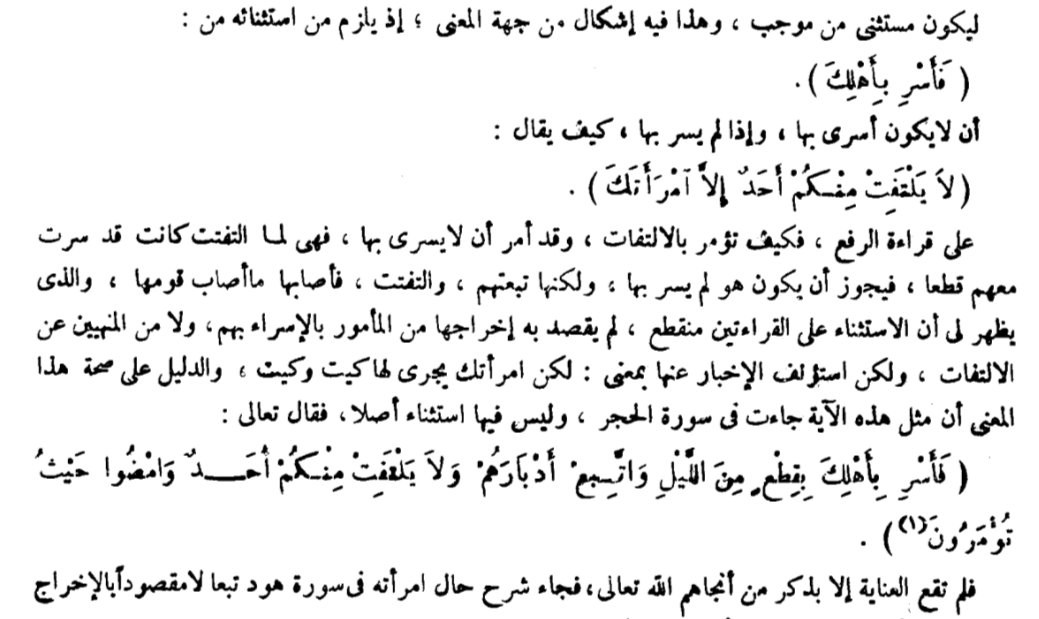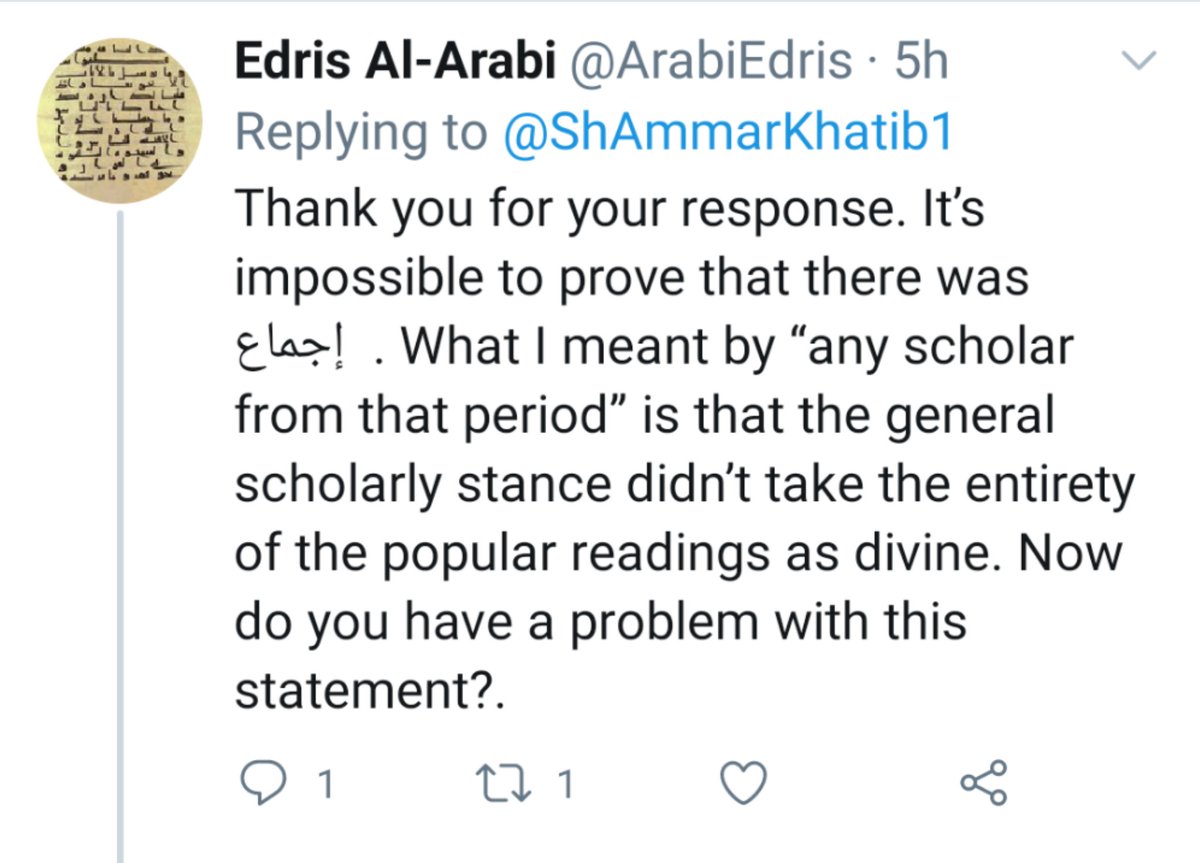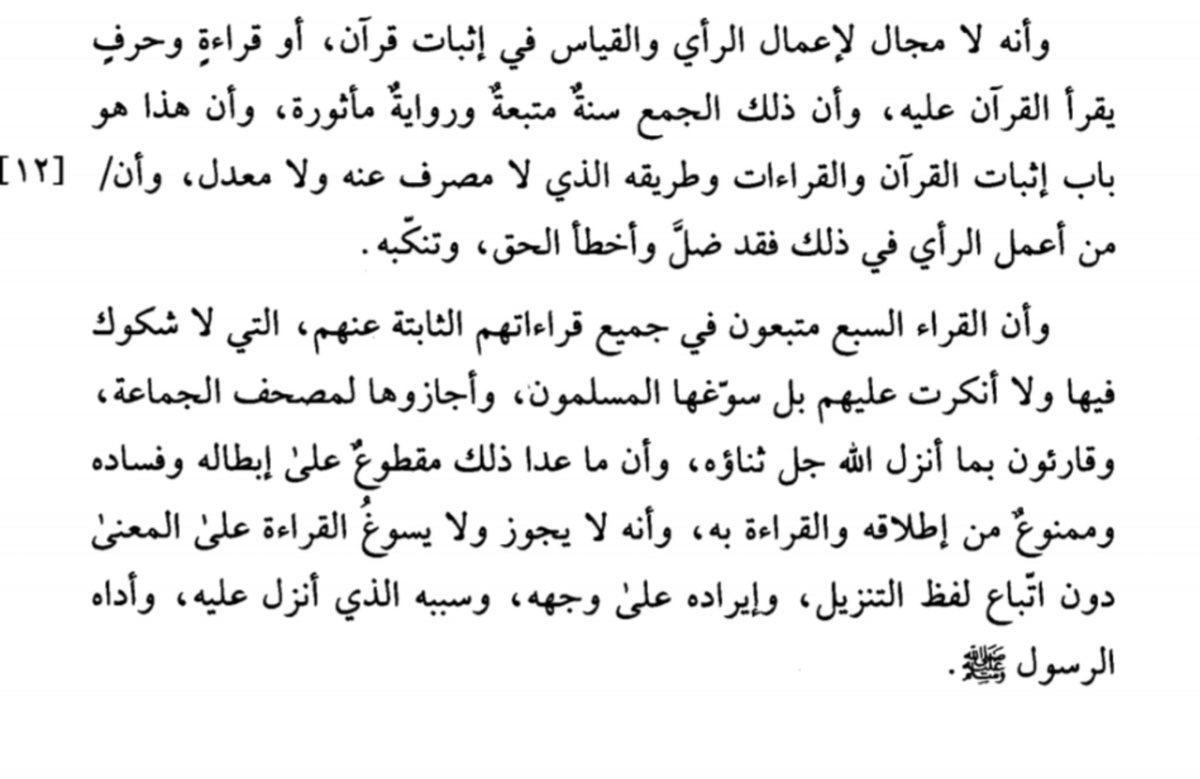I was asked about this thread. I will be commenting on some of the issues mentioned here. https://twitter.com/ArabiEdris/status/1311576115375464449">https://twitter.com/ArabiEdri...
1. We have reports about the companions seemingly criticizing or denying a Qur’anic reading.
The Sahabah were always strict in accepting a reading if they were not familiar with it.
The Sahabah were always strict in accepting a reading if they were not familiar with it.
They were so cautious and a dispute occurred when they suspected a variation in reading that was not taught or approved by the Prophet PBUH.
2. Similarly, the scholars of Arabic and tafsir might criticize or reject a reading due to different reasons. Among these reasons is the rejection of a reading based on the meaning. Clearly, these scholars were not questioning the authenticity of the Qur& #39;anic text but rather the
transmission of the reading and that the reading was actually a mistake made by a successor in his recitation...or simply because the reading is not widely attested in their opinion...
This is an important topic and one cannot deny it since these critiques are well documented in the Islamic tradition.
However, as I explained before in other threads, this practice was all part of the tradition of filtering Qira& #39;at and
However, as I explained before in other threads, this practice was all part of the tradition of filtering Qira& #39;at and
choosing what& #39;s more authentic and more common in the language as well.
The issue here is some people are claiming that the understanding of every single Muslim scholar in the early centuries of Islam was "that the reading traditions aren’t entirely divine and that many reading variants were introduced by humans".
This is completely WRONG.
This is completely WRONG.
This is also a misrepresentation of the opinion of some scholars who might support the theory that the Sahabah were given the permission to recite based on paraphrasing the meaning, which I discussed in detail in my published paper on Yaqeen.
It was the Sahabah and their students who transmitted the famous statement:
القراءة سنة متبعة
قراءة القرآن سنة، يأخذها الآخر عن الأول
Meaning that the reading tradition is a practice to be followed precisely and that we are supposed to read exactly as we were taught.
القراءة سنة متبعة
قراءة القرآن سنة، يأخذها الآخر عن الأول
Meaning that the reading tradition is a practice to be followed precisely and that we are supposed to read exactly as we were taught.
In Fada& #39;il Al-Qura& #39;n, Abu & #39;Ubaid narrated a similar narration attributed to & #39;Urwah Bin Az-Zubair that one must read according to the way he was taught.
Many early scholars confirmed this statement regarding the reading tradition such as Sibawayh, Al-, Farra& #39; etc...
سيبويه: (إلا أن القراءة لا تخالف، لأن القراءة السنة).
الفراء: (والقراء لا تقرأ بكل ما يجوز في العربية).
الزجاج: (ويجوز "بزينةٍ الكواكبُ"، ولا أعلم أحدا قرأ بها
سيبويه: (إلا أن القراءة لا تخالف، لأن القراءة السنة).
الفراء: (والقراء لا تقرأ بكل ما يجوز في العربية).
الزجاج: (ويجوز "بزينةٍ الكواكبُ"، ولا أعلم أحدا قرأ بها
In fact, the reader Abu & #39;Amru himself stated that it was not up to him to read according to his own preferences or as he was pleased but rather to recite according to how he had learned.
Abu Bakr Al-Anbari said:
"...and that is because if one were to recite according to words that differ with the wording of the Qur’an despite approximating its meaning and general intent, then it would be permissible to recite in place of “al-ḥamdu lillāhi rabbi al-ʿālamīn”
"...and that is because if one were to recite according to words that differ with the wording of the Qur’an despite approximating its meaning and general intent, then it would be permissible to recite in place of “al-ḥamdu lillāhi rabbi al-ʿālamīn”
the phrase “al-shukru lil-bārī malik al-makhlūqīn.” And the flexibility in this regard would continue to increase until the entire wording of the Qur’an was nullified and replaced with that which would be a fabrication upon God and a lie upon his Messenger"
Al-Qurtubi, al-Jamiʿ li-ahkam al-Qurʾan, 21:329–30.
I think these quotes are sufficient to make the point that the following statement is wrong:
"...but if you go back in time to the early centuries of Islam and tell any scholar that...etc".
I think these quotes are sufficient to make the point that the following statement is wrong:
"...but if you go back in time to the early centuries of Islam and tell any scholar that...etc".
2. Next, I will be discussing the readings mentioned in the original thread. More to come on this...
@RedwanRB @ArabiEdris
No need to make yourself tired with listing all these examples you& #39;re mentioning. I& #39;m aware of them...
Like I said before, these examples are well documented in the Islamic tradition. However, I was discussing your claim that if you ask ANY scholar in
No need to make yourself tired with listing all these examples you& #39;re mentioning. I& #39;m aware of them...
Like I said before, these examples are well documented in the Islamic tradition. However, I was discussing your claim that if you ask ANY scholar in
the early centuries of Islam they will tell you that "the reading traditions aren’t entirely divine and that many reading variants were introduced by humans".
إجماع!
هذه دعوى كبيرة تحتاج إلى أدلة صحيحة صريحة.
إجماع!
هذه دعوى كبيرة تحتاج إلى أدلة صحيحة صريحة.
If you read my paper on Yaqeen, you will notice that I mention Az-Zamakshari along with other names.
You didn& #39;t say for example, this the opinion of some scholars like
الزمخشري
You didn& #39;t say for example, this the opinion of some scholars like
الزمخشري
As for why the scholars rejected or criticized some readings, I already addressed this issue before and this is not really what I& #39;m discussing here.
Some people claim that there is a contradiction in the canonical readings of 11:81, when some brothers pointed out that scholars of tafsir have an easy explanation for this, they complain that this is "against scientific methodology" and causes "theological problems". Why?
Because they claim that God would not say this because it is confusing.
Making claims about what God would or would not do because you subjectively find it confusing is not a scientific methodology to begin with!
Making claims about what God would or would not do because you subjectively find it confusing is not a scientific methodology to begin with!
Regarding the 2 readings of 11:81, we need to first establish the following:
1. The Qur& #39;an might mention the same story in different places in the Qur& #39;an with different wording and different styles... meaning that the same story can be narrated differently.
1. The Qur& #39;an might mention the same story in different places in the Qur& #39;an with different wording and different styles... meaning that the same story can be narrated differently.
For example, Allah talks about what Iblis said in 7:12
﴿قالَ ما مَنَعَكَ أَلّا تَسجُدَ إِذ أَمَرتُكَ قالَ أَنا خَيرٌ مِنهُ خَلَقتَني مِن نارٍ وَخَلَقتَهُ مِن طينٍ﴾
[الأعراف: ١٢]
and in 15:33 he said:
﴿قالَ لَم أَكُن لِأَسجُدَ لِبَشَرٍ خَلَقتَهُ مِن صَلصالٍ مِن حَمَإٍ مَسنونٍ﴾
﴿قالَ ما مَنَعَكَ أَلّا تَسجُدَ إِذ أَمَرتُكَ قالَ أَنا خَيرٌ مِنهُ خَلَقتَني مِن نارٍ وَخَلَقتَهُ مِن طينٍ﴾
[الأعراف: ١٢]
and in 15:33 he said:
﴿قالَ لَم أَكُن لِأَسجُدَ لِبَشَرٍ خَلَقتَهُ مِن صَلصالٍ مِن حَمَإٍ مَسنونٍ﴾
It would be wrong to say: well which statement did Iblis say?!
If Allah quotes a person, He can paraphrase them in any way He wishes.
If Allah quotes a person, He can paraphrase them in any way He wishes.
2. The wife of Lut was going to be punished regardless of whether she left with her household or not.
إِنَّهُ مُصيبُها ما أَصابَهُم
إِنَّهُ مُصيبُها ما أَصابَهُم
3. The "contradiction" is all based on how you interpret the readings. The Qur& #39;an is very explicit about her punishment and not about the other details of her leaving or staying behind.
Many scholars of tafsir and Qira& #39;at gave their explanation concerning
these 2 readings.
these 2 readings.
Some scholars go with the opinion that it& #39;s
استثناء منقطع
meaning that the wife of Lut wasn& #39;t exempted from leaving nor from looking back (iltifat)...Therefore, the 2 readings don& #39;t talk about Lut& #39;s wife leaving or staying behind or looking back.
استثناء منقطع
meaning that the wife of Lut wasn& #39;t exempted from leaving nor from looking back (iltifat)...Therefore, the 2 readings don& #39;t talk about Lut& #39;s wife leaving or staying behind or looking back.
The Qur& #39;an mentioned her as she was going to suffer the fate of the others.
Another good explanation is that it& #39;s possible that the wife of Lut followed her household but she didn& #39;t complete the journey and she looked back and got destroyed.
Another good explanation is that it& #39;s possible that the wife of Lut followed her household but she didn& #39;t complete the journey and she looked back and got destroyed.
According to this explanation, Lut didn& #39;t take her with him...she attempted to follow them and wasn& #39;t able to complete the journey because she got destroyed.
Your previous statement was different. However, let& #39;s go with what you said here now. Yes, I don& #39;t agree with your analysis.
You need clear evidence that this was the general scholarly stance as you& #39;re suggesting here. The general evidences are against you.
You need clear evidence that this was the general scholarly stance as you& #39;re suggesting here. The general evidences are against you.
Please refer to this paper:
https://yaqeeninstitute.org/ammar-khatib/the-origins-of-the-variant-readings-of-the-quran/
I">https://yaqeeninstitute.org/ammar-kha... discussed the theory you& #39;re referring to...Qirāʾah bi-l-maʿná vs qirāʾah bi-al-talaqqī.
Some scholars talked about a limited degree of paraphrasing. They didn& #39;t say the companions weren& #39;t allowed to read as they pleased.
https://yaqeeninstitute.org/ammar-khatib/the-origins-of-the-variant-readings-of-the-quran/
I">https://yaqeeninstitute.org/ammar-kha... discussed the theory you& #39;re referring to...Qirāʾah bi-l-maʿná vs qirāʾah bi-al-talaqqī.
Some scholars talked about a limited degree of paraphrasing. They didn& #39;t say the companions weren& #39;t allowed to read as they pleased.
Also, you need to differentiate between two things:
1. Scholars criticizing or rejecting some readings.
2. Scholars clearly saying that some readings are based on ijtihad and wasn& #39;t based on athar. For example, Az-Zamakshari clearly stated that.
1. Scholars criticizing or rejecting some readings.
2. Scholars clearly saying that some readings are based on ijtihad and wasn& #39;t based on athar. For example, Az-Zamakshari clearly stated that.
You know that Ibn Mujahid criticized some readings and you know his story with
ابن شنبوذ وابن مقسم.
ابن شنبوذ وابن مقسم.
Yes. At-Tabari criticized and rejected some readings. However, did ever say in his tafsir that it was permissible for the readers to invent their own readings?
He didn& #39;t.
He has many clear statements that readers must follow the athar:
He didn& #39;t.
He has many clear statements that readers must follow the athar:
Az-Zajjaj Also criticized some readings. He has many clear statements that one must follow the reading tradition and stick to transmission because Al-Qira& #39;ah is Sunnah.
He also makes the point that if the Qira& #39;ah is widely attested and narrated then one should stick to it.
He also makes the point that if the Qira& #39;ah is widely attested and narrated then one should stick to it.
Also, you can& #39;t invent a reading just because it agrees with the Arabic language... It& #39;s a Bid& #39;ah if you do that.
He also talks about the case when the reading is not widely narrated and it doesn& #39;t agree with good Arabic grammar it should not be recited/approved.
He also talks about the case when the reading is not widely narrated and it doesn& #39;t agree with good Arabic grammar it should not be recited/approved.
We need to carefully examine the statements of scholars before drawing any conclusions.

 Read on Twitter
Read on Twitter












